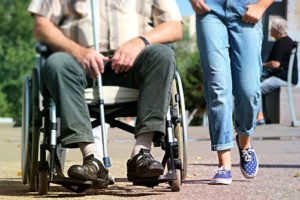

Elder Abuse Vs. Elderly Self-Neglect: Signs And Differences
 Elder abuse is a real concern for anyone having a loved one in a nursing home. It’s definitely wise to check often on your admitted family member and to look out for signs of mistreatment or neglect. However, you may be having second thoughts due to the possibility that some symptoms are the result of your own loved one’s self-neglect and not some form of mistreatment by the facility.
Elder abuse is a real concern for anyone having a loved one in a nursing home. It’s definitely wise to check often on your admitted family member and to look out for signs of mistreatment or neglect. However, you may be having second thoughts due to the possibility that some symptoms are the result of your own loved one’s self-neglect and not some form of mistreatment by the facility.
How can you tell if your elderly loved one’s neglect is self-inflicted? And if it is, what can you do about it?
Self-Neglect As A Form Of Abuse
Not many people may realize that self-neglect among the elderly may actually be a form of abuse in South Carolina. There are generally five types of elderly abuse recognized in the state: physical, sexual, emotional, verbal, financial, and neglect. This last type has two broad categories: caregiver neglect and self-neglect.
The term “self-neglect” refers to when a person threatens their own wellbeing or safety, such as by failing to take medications, undernourishing themselves, or failing to maintain proper hygiene. As the name implies, no other party is involved in self-neglect except the person itself. Despite this, self-neglect is included in South Carolina’s reportable forms of elderly abuse. In fact, only a few states do not consider self-neglect as a form of abuse.
As the term “abuse” may include self-inflicted neglect, some people use the word “mistreatment” to specifically refer to abuse that is done by others (not self-inflicted). In other words, you may hear the term “elderly abuse” referring to the elderly’s self-neglect, but when the term “mistreatment” is used, it specifically excludes self-neglect.
Particular Signs Of Self-Neglect
Some symptoms of self-neglect may overlap with other forms of mistreatment, such as the elderly losing weight or developing health issues. But there are particular signs that may indicate self-neglect. According to the National Adult Protective Services Association, these are the most reported symptoms of self-neglect:
- Lack of fresh food, or not eating
- Refusing or not seeking the medical care they need
- Dressing unsuitably for the weather
- Not cashing regular checks
- Giving away money carelessly
- Refusing visitors into residence
- Dirty or poorly maintained home
- Cluttered pathways at home
- Inadequate heating, plumbing, or electrical service at home
- Animal feces in the home.
The National Center on Elderly Abuse also recommends watching out for these behaviors in your senior loved one:
- Hoarding of objects (newspapers, mail, etc) or animals to the extent that the person’s wellbeing is compromised
- Leaving a stove on unattended
- Poor hygiene
- Inability to attend to housekeeping
- Confusion
You may notice that these symptoms can occur even if the elderly is not admitted to a nursing home. It is worth noting that self-neglect can also happen even when the adult is living in their own home, whether or not they are assisted by workers such as nurses and home care aides.
What To Do When A Loved One Is Self-Neglecting
If you suspect that your senior loved one is failing to care for themselves, contacting Adult Protective Services (APS) is a start towards helping them get proper care. Call your local APS agency especially if you notice your loved one engaged in any of the following:
- Constantly appearing disheveled or dirty
- Having strong odor of feces or urine
- Having matted or lice-infected hair
- Appearing malnourished or dehydrated
- Dressed unsuitably
- Has a serious untreated medical condition
- Living in squalor.
Don’t hesitate to call 911 if your loved one’s behavior has led to a life-threatening situation.
If you suspect that a nursing home staff or any other caregiver has failed their duty to your loved one, you may have legal options. Consult with an nursing home abuse attorney in your state to see if you have an abuse case and what legal steps you can take.
In South Carolina, the law firm of Kassel McVey has been trusted by families for decades. Since we opened our doors in 1985, we have gained extensive experience in handling elder abuse cases. Call us at (803) 256-4242 today if you suspect a loved one is a victim of South Carolina nursing home abuse or neglect.
Personal Injury Lawyers 1330 Laurel Street Columbia, SC 29201 Phone: 803-256-4242
Mailing Address
Post Office Box 1476
Columbia, South Carolina 29202
Fax: (803) 256-1952
Copyright © 2023 John D. Kassel, Attorney at Law, LLC. All rights reserved. Privacy Policy I Terms of Service | Disclaimer
This website is designed for general information only. The information should not be construed to constitute formal legal advice or the formation of a lawyer/client relationship. The results and testimonials listed on this website are specific to the facts and legal circumstances of specific cases and should not be used to form an expectation that the same results could be obtained for other clients in similar matters. This list is not a description or characterization of the quality of the firm's representation, it is not intended to compare one attorney's work to another and is in no way a guarantee of a specific result for your case.
